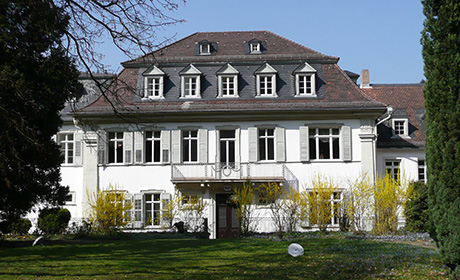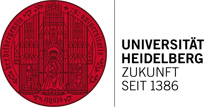Marsilius Kolleg Launches Interdisciplinary Research Projects

Founded in 2007, the Marsilius-Kolleg is a ‘Center for Advanced Study’ at Heidelberg University. The interdisciplinary college is a place of networking that develops and launches interdisciplinary research projects. Named after Marsilius von Inghen, the first rector of Heidelberg University, the college is one of the central measures of the university's institutional strategy within the framework of the Excellence Initiative. The college has so far developed six Marsilius Projects that make an important contribution to focussing and expanding the range of topics and methods of many disciplines at Heidelberg University.
Every year, twelve fellows hailing from Heidelberg University and from local non-university research institutions, and representing a wide range of disciplines, are invited to join the college in order to investigate fundamental questions from an interdisciplinary perspective. Including the current college staff, almost 70 Heidelberg researchers have already accepted a temporary fellowship at the Marsilius Kolleg. Their weekly discussions are the heart and soul of the college. With the fellowships, the college wants to strengthen the research-oriented networking between academic cultures within Heidelberg University and the Rhine-Neckar region.
Together, the fellows develop Marsilius Projects that deal with topics of theoretical and practical relevance. These projects permit the scientific connections that are built in the course of the one-year fellowships to be transformed into long-term research networks. Three Marsilius projects have been concluded successfully so far: ‘Human Dignity’ (2008–2011), ‘Perspectives of Ageing’ (2008–2011) and ‘The Global Governance of Climate Engineering’ (2009–2012). The projects ‘Ethical and Legal Aspects of Total Genome Sequencing’ (2011–2014), ‘Embodiment as Paradigm for an Evolutionary Cultural Anthropology’ (2013–2015) and ‘Equality and Inequality in Liver Allocation’ (2013–2014) are still in progress.
The Marsilius Kolleg also offers programmes and events aimed at junior researchers: The international Marsilius Academies are interdisciplinary summer or winter schools for young academics from Germany and abroad. Students are given the opportunity to investigate various aspects of an interdisciplinary research topic together with renowned researchers and to establish ties to other academic cultures and locations. The next summer school, entitled ‘Synthetic biology: promises and perils of modern biotechnology’, will take place in September 2014.
Ever since the winter term 2010/2011, the college also offers a supplementary study programme initiated by students of the university with the purpose of integrating interdisciplinary research in the students' curriculum. This programme, the Marsilius Studies, enables students of all disciplines to take a look at other areas of research and opens up ways of collaborating and of sharing information and experiences across disciplinary boundaries. The programme centres on ‘bridge seminars’ dealing with interdisciplinary topics such as ‘Evolution’ or ‘Neurobiology of the Mind’ that are held by at least two lecturers hailing from different academic cultures. The programme awards a Marsilius Certificate to those that complete the studies, but the lectures and seminars are open to all interested students.
The Marsilius Lectures, in which an outstanding researcher gives a presentation on an interdisciplinary topic once every term, is an event aimed at both students and the general public. Speakers so far have included Nobel Prize winners Günter Blobel, Christiane Nüsslein-Volhardt and Alvin Roth. The speakers are awarded the Marsilius Medal for their services in promoting interdisciplinary exchange. All Marsilius Lectures so far have been videotaped. The college's curriculum is rounded off by additional events like symposia, lectures and workshops that are initiated and organised by fellows or by Marsilius Projects.
As of the summer term 2014, the Marsilius Kolleg has two new directors: biologist Thomas Rausch and historian Bernd Schneidmüller are the successors of the college's two founding directors, sociologist Wolfgang Schluchter and virologist Hans-Georg Kräusslich. Click here to read an interview with the new directors and learn about their plans for the future.
In their regular work meetings, the members of the fellow class of 2014/2015 will explore such topics as ‘Biodiversity’, ‘Early Childhood Today: New Opportunities and Risks’ and ‘Freedom and Determinism’.
The members of the fellow class of 2014/2015:
Prof. Dr. Manfred Cierpka (Psychosomatik), Prof. Christina Gathmann, Ph. D. (Wirtschaftswissenschaften), Prof. Dr. Jens Halfwassen (Philosophie), Prof. Dr. Wolfgang Kahl (Rechtswissenschaften), Prof. Dr. Marcus Koch (Biologie), Prof. Dr. Sabina Pauen (Psychologie), Prof. Dr. Konstanze Plaschke (Anästhesiologie), Prof. Dr. Manfred Salmhofer (Theoretische Physik), Privatdozent Dr. Magnus Schlette (Philosophie), Prof. Dr. Thomas Schwinn (Soziologie), Prof. Dr. Alexander Siegmund (Geographie), Prof. Dr. Jan Stievermann (Kirchengeschichte), Prof. Dr. Joachim Wambsganß (Astrophysik).

